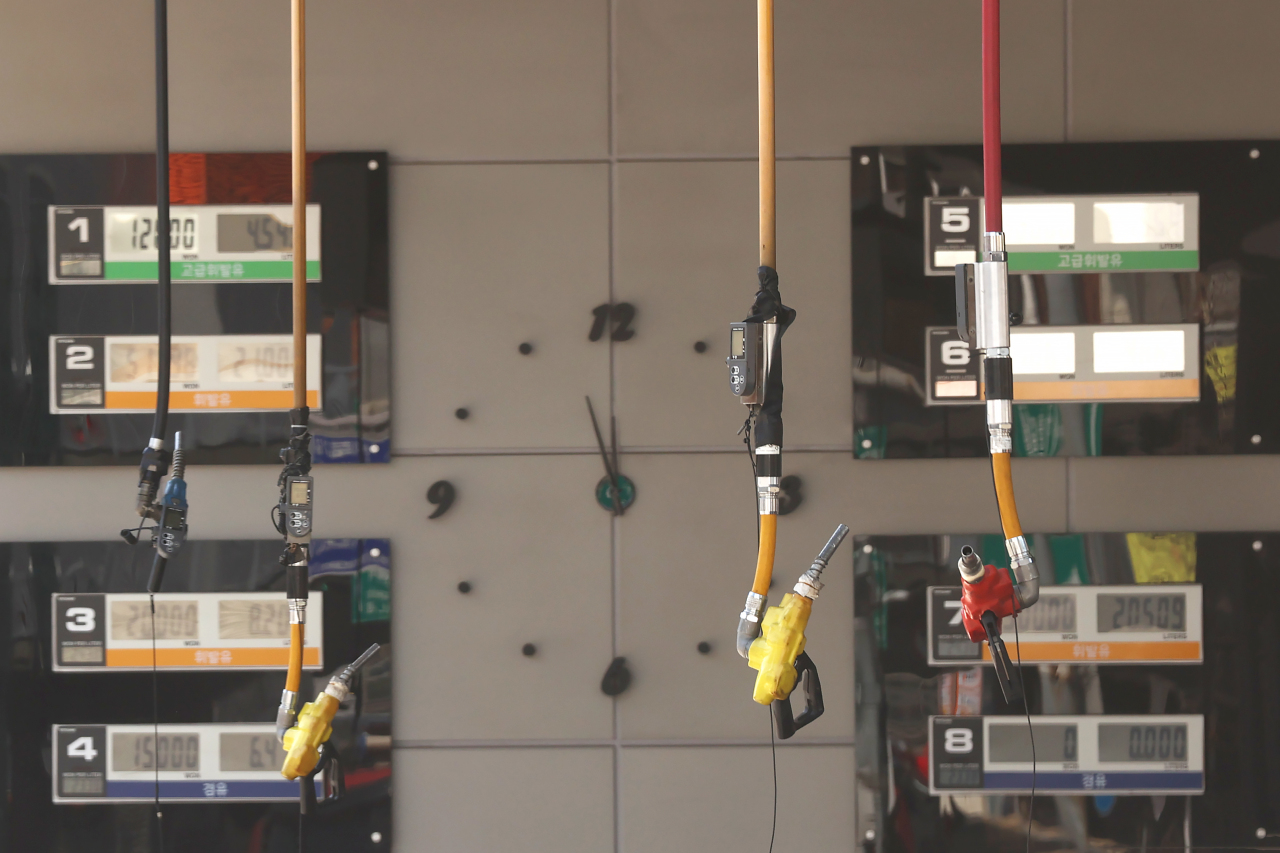
SEJONG -- Economic policymakers are reportedly mapping out measures to ease the burden of households and microbusiness owners, as the nation’s gasoline and diesel prices have surged in the wake of spiking international crude oil prices.
A core interest in the market is whether the Ministry of Economy and Finance will decide to expand the rate of tax cut on fuel from the current discount.
A Finance Ministry official was quoted by a news provider on Wednesday as saying that the government “is contemplating a revision of fuel tax cut range.”
Alongside the official, other anonymous officials via interviews with the media have not ruled out the possibility of expanding the tax cut range in the coming days or weeks.
While the government has been implementing a 20 percent tax cut on fuel as a contingency plan, there is a possibility that the slash range will be raised by five to 10 percentage points, according to the coming decision of policymakers.
Market insiders are also pinning hopes on the feasibility that car owners will enjoy a fuel tax cut of 25 or 30 percent in the coming weeks. They point to the situation involving the Russian invasion of Ukraine and the globally growing demand for petroleum products.
Among other possible measures are the fuel subsidy and fuel refund for the low-income bracket and the self-employed.
Under an introduction of the fuel subsidy, a certain portion of households would be paid some of the increases on power, gas and water bills -- in the wake of the rising fuel prices -- from the government. The fuel refund system is a sort of tax refund for low-income salaried employees or the self-employed.
On Tuesday, Kwon Young-se, vice chair of the presidential transition team, said that “there is a need to consider drawing up support measures for households and the self-employed, as there is a high possibility that a spike in oil prices will continue.”
He told transition team staffers that among the urgent and significant issues are energy and oil prices.
According to the Korea National Oil Corp. the benchmark gasoline price in the nation came to 1,999.67 won ($1.65) per liter on Wednesday.
This marked about a 30 percent surge in just one year, given the price was 1,500-1,560 won per liter in the first half of 2021.
Over the corresponding period, the benchmark diesel price also sharply climbed from around 1,450 won to 1,919.89 won per liter.
International crude oil prices are still hovering over $100 per barrel. Dubai crude, which makes up a dominant portion of Korea’s oil imports, posted $110.55 as of Tuesday.
The spike in international raw materials prices, including petroleum products, which have been reflected in the nation’s producer prices and consumer prices, is causing inflationary pressure.
Korea’s consumer prices posted on-year growth in the 3 percent range for five consecutive months, including 3.7 percent growth in February.
A core interest in the market is whether the Ministry of Economy and Finance will decide to expand the rate of tax cut on fuel from the current discount.
A Finance Ministry official was quoted by a news provider on Wednesday as saying that the government “is contemplating a revision of fuel tax cut range.”
Alongside the official, other anonymous officials via interviews with the media have not ruled out the possibility of expanding the tax cut range in the coming days or weeks.
While the government has been implementing a 20 percent tax cut on fuel as a contingency plan, there is a possibility that the slash range will be raised by five to 10 percentage points, according to the coming decision of policymakers.
Market insiders are also pinning hopes on the feasibility that car owners will enjoy a fuel tax cut of 25 or 30 percent in the coming weeks. They point to the situation involving the Russian invasion of Ukraine and the globally growing demand for petroleum products.
Among other possible measures are the fuel subsidy and fuel refund for the low-income bracket and the self-employed.
Under an introduction of the fuel subsidy, a certain portion of households would be paid some of the increases on power, gas and water bills -- in the wake of the rising fuel prices -- from the government. The fuel refund system is a sort of tax refund for low-income salaried employees or the self-employed.
On Tuesday, Kwon Young-se, vice chair of the presidential transition team, said that “there is a need to consider drawing up support measures for households and the self-employed, as there is a high possibility that a spike in oil prices will continue.”
He told transition team staffers that among the urgent and significant issues are energy and oil prices.
According to the Korea National Oil Corp. the benchmark gasoline price in the nation came to 1,999.67 won ($1.65) per liter on Wednesday.
This marked about a 30 percent surge in just one year, given the price was 1,500-1,560 won per liter in the first half of 2021.
Over the corresponding period, the benchmark diesel price also sharply climbed from around 1,450 won to 1,919.89 won per liter.
International crude oil prices are still hovering over $100 per barrel. Dubai crude, which makes up a dominant portion of Korea’s oil imports, posted $110.55 as of Tuesday.
The spike in international raw materials prices, including petroleum products, which have been reflected in the nation’s producer prices and consumer prices, is causing inflationary pressure.
Korea’s consumer prices posted on-year growth in the 3 percent range for five consecutive months, including 3.7 percent growth in February.



![[Herald Interview] 'Amid aging population, Korea to invite more young professionals from overseas'](http://res.heraldm.com/phpwas/restmb_idxmake.php?idx=644&simg=/content/image/2024/04/24/20240424050844_0.jpg&u=20240424200058)












![[KH Explains] Korean shipbuilding stocks rally: Real growth or bubble?](http://res.heraldm.com/phpwas/restmb_idxmake.php?idx=652&simg=/content/image/2024/04/25/20240425050656_0.jpg&u=)

